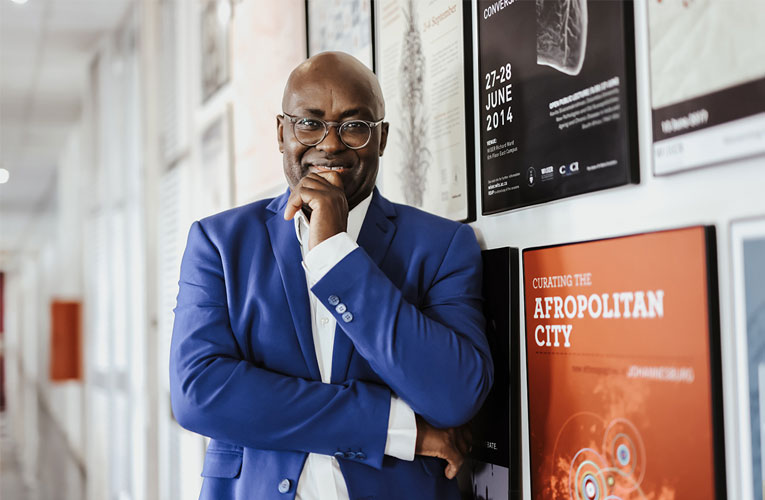Wits scholar Achille Mbembe receives his prize in person in Norway
By CityLife Arts Writer
A few months ago, we reported that one of the country’s leading research professors at Wits Achile Mbembe was awarded one of the richest prizes for academic research in the world, the Holberg Prize.
Well yesterday, June 6, 2024, at a ceremony held in Norway, the scholar was conferred with the prize.
At a prestigious award ceremony held yesterday at the University Aula in Bergen, Professor Achille Mbembe received the international research award from Norway’s Minister of Research and Higher Education Oddmund Hoel.
The Holberg Prize is worth NOK 6 million (approx. EUR 525,000) and is awarded annually for outstanding contributions to research in the humanities, social sciences, law or theology.
Expressing his deepest gratitude for the award, Mbembe referred to late Holberg Laureate Bruno Latour, when declaring that “the problems that have come to me over the years might have relevance to you as well.” “In my case”, Mbembe continued, “most of the ‘problems that have come to me over the years’ had ‘Africa’ as their name and their face.”
Mbembe receives the prize for his pioneering research in African history, postcolonial studies, humanities, and social science over four decades. Both as an academic and as a public intellectual, he is known for his ability to bridge existing thinking on colonialism and decolonisation with pressing questions on topics such as contemporary migration regimes, global citizenship, restitution and reparation, technology, climate change and planetary futures.
In his acceptance speech, Membe used a biblical image when he referred to Africa as “the stone which, for so long, was rejected by the builders” in the conversation about how to deal with issues of cohabitation and our relation to the Earth and to each other.
“It may well be that in turning this rejected stone into one of the cornerstones of the common home we strive to build, things in their infinite probabilities might suddenly look different”, said the Laureate. “Maybe for the first time in the history of the human race, thinking our relations to each other through our relation to Africa might finally pave the way to the new ethics of sharing and repairing the Earth we are striving for.”
Mbembe also described how power is now shifting from the human to the technological, and how “reason is increasingly subsumed by instrumental rationality”. “’To decolonize’ must start from the assumption that knowledge cannot be reduced to computational information processing”, he said. “We must recover the ability to think because neither calculation alone, nor computation are sufficient for explaining life, let alone for ensuring ours and the planet’s durability.”
In his speech, Minister Oddmund Hoel extended his warmest congratulations to the Laureate and thanked him for directing attention towards some of the greatest struggles of our time. “When shaping our future, we need the perspectives which question the narratives that have always been told”, he said. “And in the very centre of this questioning, we find this year’s Laurate.”
About the Holberg Laureate
Achille Mbembe is research professor of history and politics at the Wits Institute for Social and Economic Research (WISER), University of the Witwatersrand, Johannesburg, South Africa. He is also the Director of the Innovation Foundation for Democracy. He was educated in Cameroon and in France where he obtained his PhD in History at the Université Paris 1 Panthéon-Sorbonne and a a Diplôme d’études approfondies (DEA) at the Institut d’études politiques de Paris.
Mbembe has taught at various universities in the United States, including Columbia University, the University of Pennsylvania, the University of California at Berkeley and at Irvine, Yale University, Duke University and Harvard University. A winner of the Ernst Bloch Award and the Gerda Henkel Prize, he is a member of the American Academy of Arts and Sciences and a Fellow of the British Academy.
Mbembe holds Honorary Doctorates from the Paris 8 University (France), the Catholic University of Louvain (Belgium) and the University of Bergen (Norway). His work has been translated in 17 languages (English, Spanish, Italian, German, Dutch, Portuguese, Arabic, Danish, Swedish, Norwegian, Turkish, Romanian, Polish, Slovenian, Catalan, Finnish, and Mandarin). His latest book is La communaute terrestre (Editions La Découverte, Paris, 2023).
About the Holberg Prize
Established by the Norwegian Parliament in 2003, the Holberg Prize is one of the largest annual international research prizes awarded to scholars who have made outstanding contributions to research in the humanities, social science, law or theology. The Prize is funded by the Norwegian Government through a direct allocation from the Ministry of Education and Research to the University of Bergen. Previous Laureates include Julia Kristeva, Jürgen Habermas, Manuel Castells, Onora O’Neill, Cass Sunstein, Paul Gilroy, Griselda Pollock, Martha Nussbaum, and Shelia Jasanoff. To learn more about the Holberg Prize and the call for nominations, visit: https://holbergprize.org/en.










